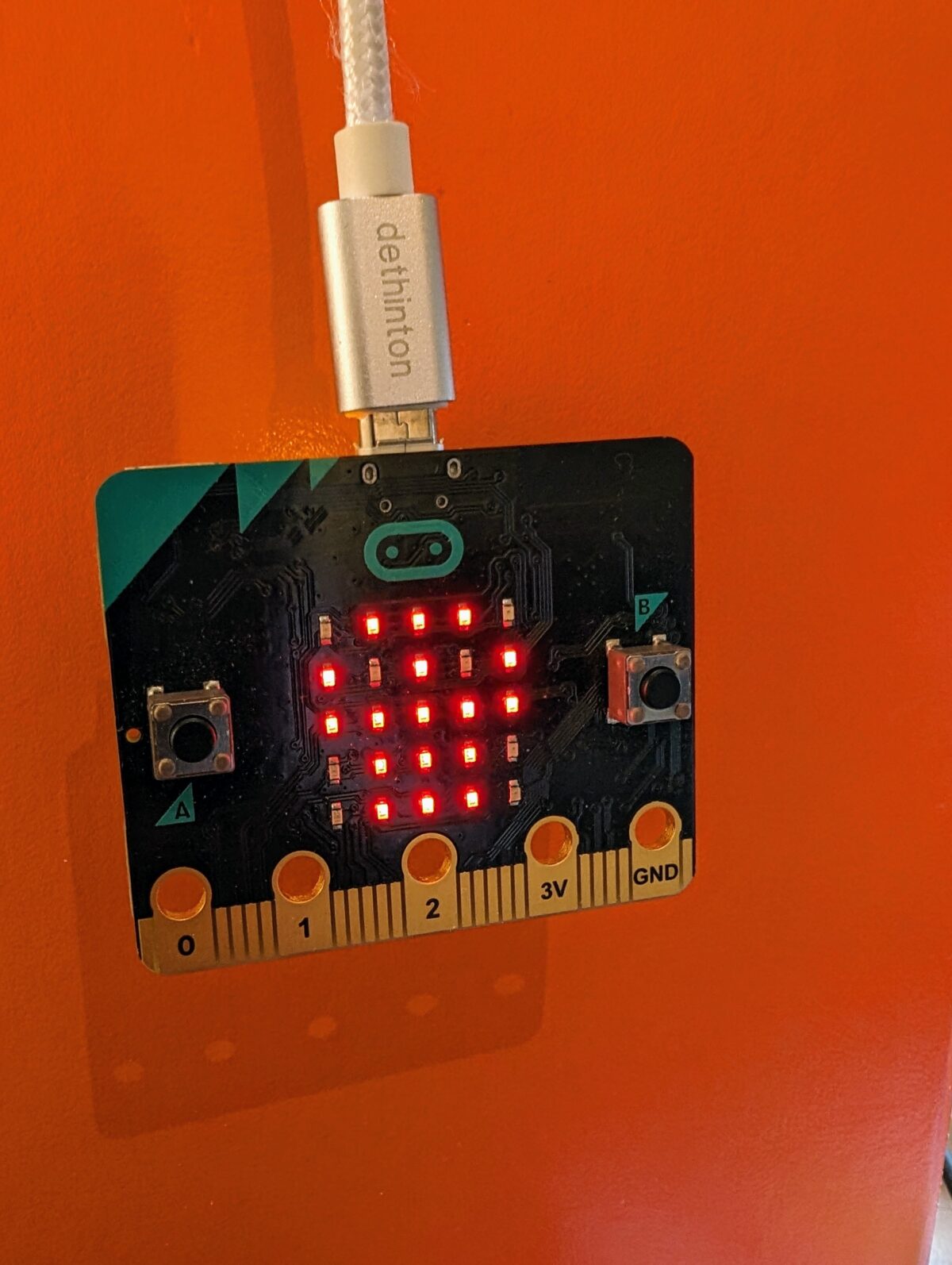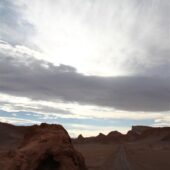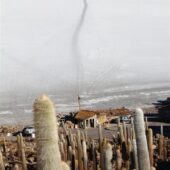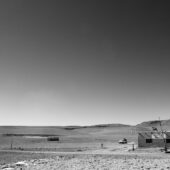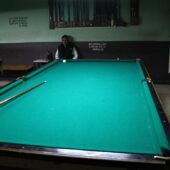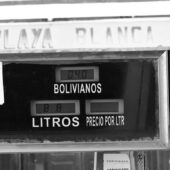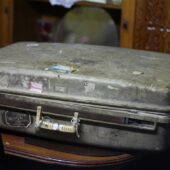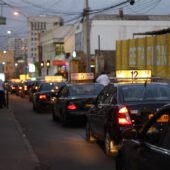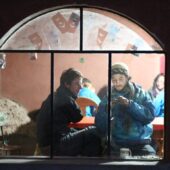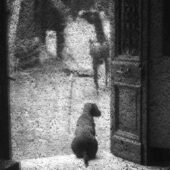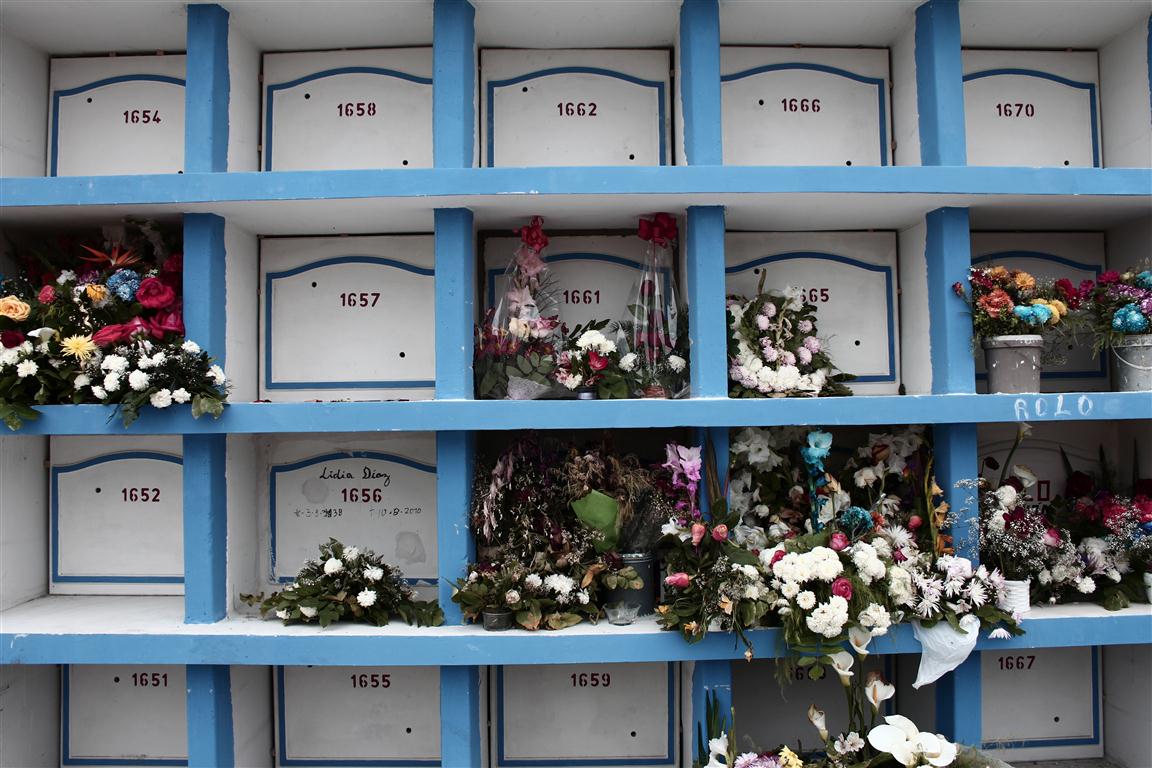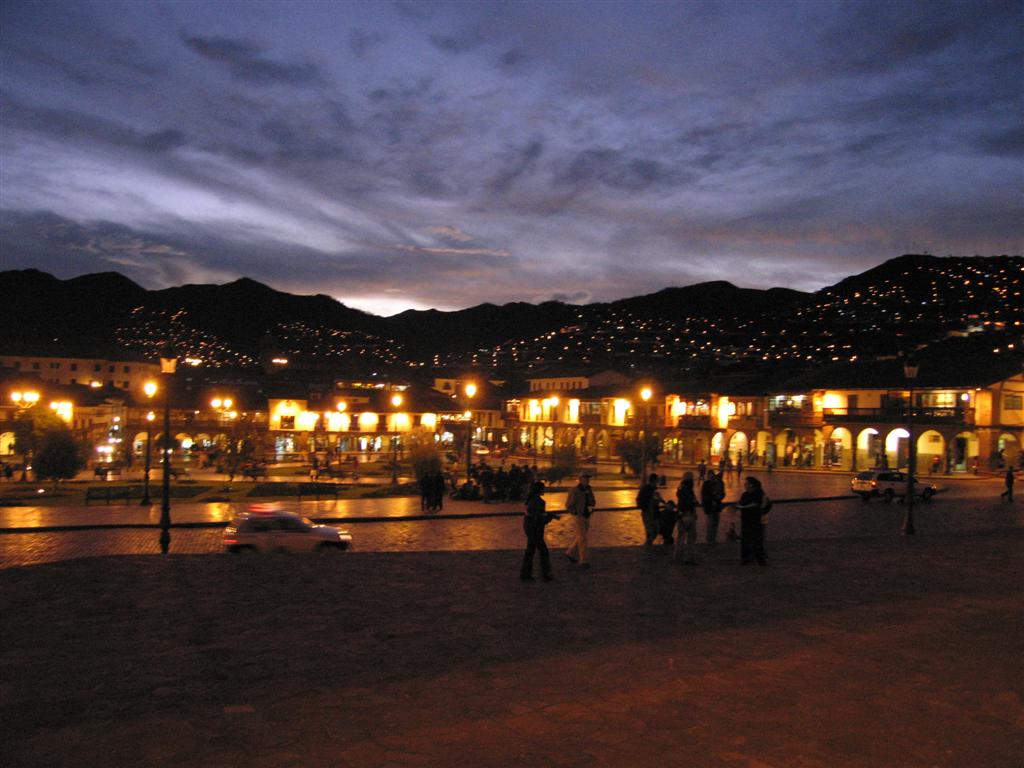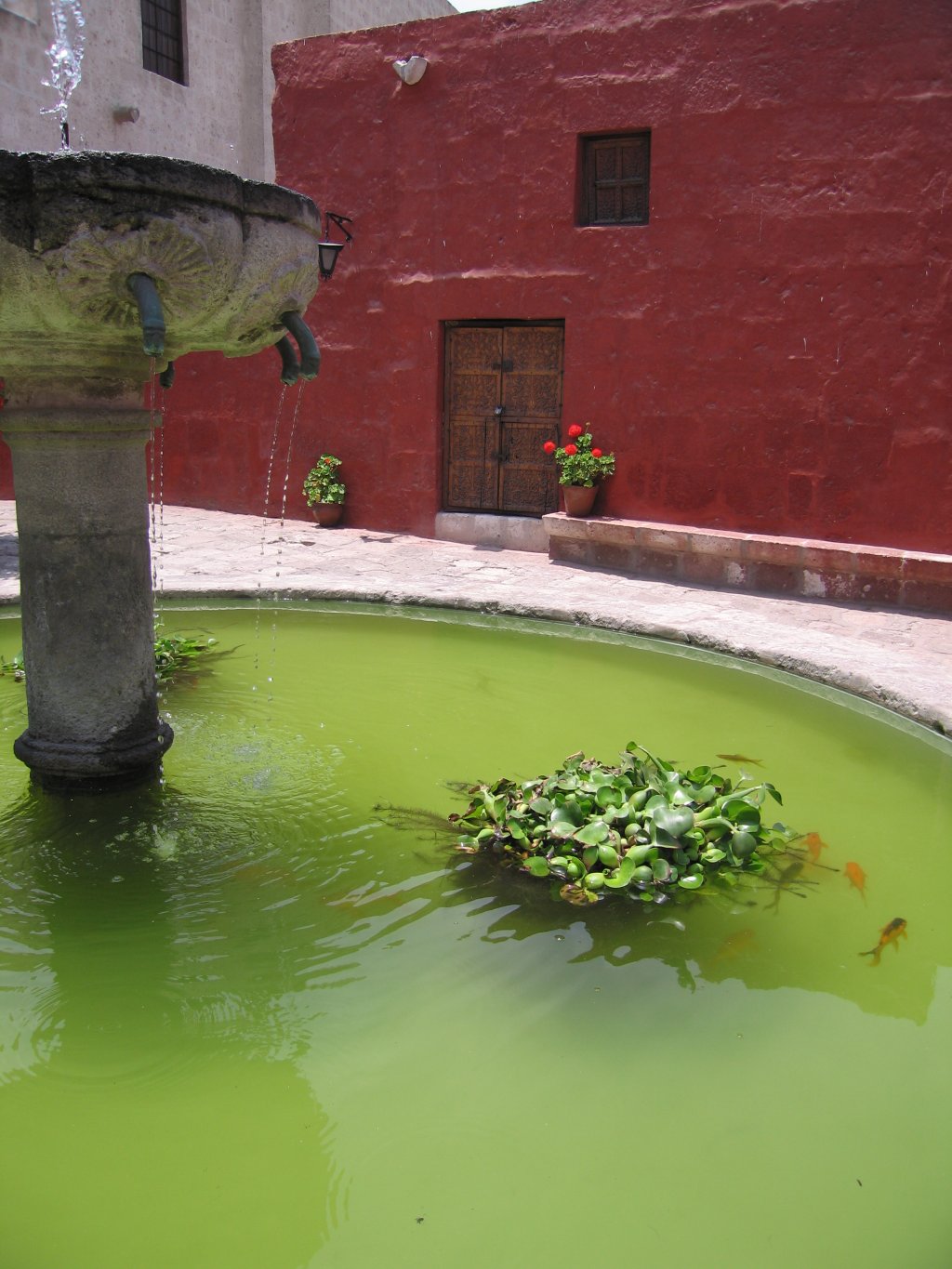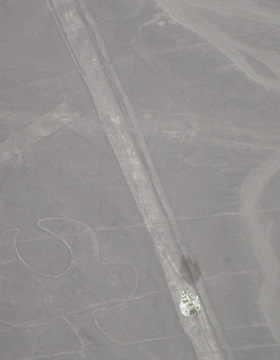In the past, this website was sort of my place to keep family and friends in touch. I first set it up in 2005, just before going away to Peru on travels. It was a great. Facebook had been invented but wasn’t generally available or popular yet, other platforms weren’t well thought through or scattered, Twitter didn’t exist. But installing WordPress on my cheap Yahoo web hosting turned out to be one of the easiest ways to publish content and share it with the world.
Tag: peru
Peru, Chile & Bolivia Gallery
A gallery of some of my favourite in-camera images from Peru, Chile and Bolivia a few weeks ago. They’re not necessarily strong photos or selected as such – just photos I myself enjoy. I have more, but they either need tweaking (straightening horizons, etc) or some real work to bring out the best. I’ll post them up soon enough. No particular order.
Enjoy:
A Better Type of Criminal
Arica is a relative crime free city, but as with anywhere it pays to be attentive. Most crime in Chile is opportunistic in nature, as opposed to the occassional strangle muggings and minor ATM kidnappings you have to be wary of in Bolivia and Peru.
So I heard this story, of an eminent British archaelogist* I met there. He and his wife had been eating in a restaurant on main street and it seems someone quietly removed their bag.
But what I found fascinating was that the thieves went to some trouble to return their passports to the consulate. Consequently they were able to continue their travels relatively unimpeded.
If only all criminals were so considerate.
* it’s not difficult to find an archaelogist in Arica…they’re attracted to the area like flies to the proverbial. The ultra-dry environment of the region preserves like no other place in the world.
Border Crossings and Empty Airports
I’m sitting in the emptiest airport I’ve ever experienced. I suspect they only operate a couple of flights a day from Tacna. Consequently my only company appears to be a bored check-in attendant for a different airline and a barman who’s mopping the floor.
And I’ve finished all my books. I have little else to do except get the phone out, take advantage of the free Wi-Fi in Peruvian airports and get blogging.
So, let me tell you about how to get from Arica in Chile to Tacna in Peru.
The two cities are only some 40km apart, but transport between them isn’t what you might expect.
The simplest way is to get your hotel to order a taxi to your destination on the other side. They will deal with the crossing, but from Chile this can be expensive, running at around £35. Similarly, in the opposite direction it’s perfectly possible to get ripped off, as I did last week when I arrived here.
You need two things…your passport and some local currency. In Arica you can take a taxi for £2 to the “Terminal Internacional” where you’ll expect buses but will actually see a huge number of USAnian cars. You find a driver going to the border pay the station fee (200 pesos, 40p) and then go to an office to do some paperwork. You then get shown to your collectivo.
These are always US cars of various vintage. I got a really seventies Crown Victoria driven by a brassy old lady whose hair waved in the wind out of the window. The car contained 5 passengers…a handy one extra than a European or Eastern equivalent, hence more profit. For her troubles you pay just 2000 pesos, about £3.
She took us to the border, made sure we were OK and left. There, waiting, were other collectivos heading to Tacna. They all pass the airport, so no problem. You go through Chilean customs and then get driven the short distance to Peruvian customs, again in a USAnian car, albeit this time I got a more modern but nondescript GM thingy. Cost here was 2500 pesos (they take Chilean money cheerfully.)
That’s it. For less than a tenner you can cross the border. Don’t do like I did the other way last time and get ripped off by a driver taking you to the airport…you should spend more than about £5 to reach the border from the airport even by taxi as it isn’t far. Ask first for the price. Also check whether it’s all the way to Arica, or just to the border (say ‘aduana.’)
Arrangements, part dos
Anyone who’s experienced the death of someone close to them will know that there is often a lot to do. No exceptions here, plus the added pressure of limited time. However, I’m not entirely unhappy about the time thing… makes me get things done.
Cementaria Parque de Arica
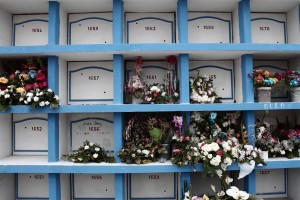
So, following the funeral I went yesterday to the cemetary to finish off the paper work. The tomb is owned in perpetuity by me, although a typical arrangement, that may seem strange in Europe, is to simply rent a tomb for a number of years. Once that time is up the coffin is disinterred and transferred to a shared grave. I also had to sort out maintenance again, in perpetuity. It’s not a lot each year, but with no easy way of paying fifteen pounds to an account in Chile every now and then I had no option.
I actually saw this happening on my second visit. You could see a clearly subdued couple watching as the coffin was lifted from a tomb, cleaned up, sealed in plastic, then loaded onto a hearse. It was a sad sight.
And it’s all made slightly bizarre by the music that’s piped into the cemetary. If you have a funeral it does seem to be suitably sombre, but at all other times they appear to often play cheerful music for the workers to enjoy.

It’s tricky feeling sombre and respectful when you can hear an Abba song.
Still, at father’s tomb it wasn’t so audible.
I took some photos, walked around, paid my respects, and headed back to town for a meeting with the reverend David Hucker who carried out the bilingual service. He’s clearly a nice man, and initially refused my attempt to pay for the service. It had to be turned into a donation to his church before he’d accept. Given the service included a singer, I was amazed. The kindness of people here doesn’t cease to amaze me. We chatted about why he and his wife came here, my own background and so on. All very pleasant.
Headstones
I felt like I’d taken enough of Joaquin’s time so I decided I’d make the effort to arrange the headstone entirely on my own. With limited Spanish and nothing more than a vague idea of where a stonemason may be, I set off.
Now, this is where you have to admire the Chilean desire for efficiency. The hospital is at one end of a road approximately 1km long. At the other, lies the municipal cemetary (not the one Chris is in). Along this road are numerous funeral directors and various parked hearses, ranging from custom made examples to tired looking old American station wagons. Given this is one of the more important routes to the hospital, I can’t help wonder if it helps reassure incoming patients. Still, it’s efficient.
After some aimless wandering I spotted a suitable stone mason, went inside, and did my best. On Monday morning I’m either getting exactly what I wanted, or a very rough approximation with some crazy typeface. Let’s see. Again, Chilean flexibility and a can-do attitude helped. I explained I wasn’t likely to be around for much longer and that I couldn’t wait the usual week. He made it happen.
The House

The next job of the day was to visit the house where my father lived. He’d rented a room here for over ten years.
I had a real shock when the first item brought in was his suitcase. It’s the only recognisable item I saw in his belongings – the same cream coloured Samsonite suitcase he’d used throughout much of the eighties. It was a touch battered, but it even still carried a sticker for a hotel in Sluis in the Netherlands (a small, sleepy town once notorious for having the highest density of sex shops in the world) at which I remember him buying me waffles with cream and strawberries each time we visited on his tours.
From there on in it went a little downhill. There was no wallet, no photo album, no sign of his early past in South America. Apart from a couple of postcards from his days in Belgium(!) and his passports going back to the mid-eighties there was nothing. None of my letters to him were there, nor any photos of me or any of his children. I still have to visit another place where he apparently kept some stuff, but mostly I believe they were just things he sold on the market where had a small spot.

So what did I find out about him?
Looking at his passports he travelled an awful lot up until around 2006 when he broke his hip-bone in a fall during a tussle of some sort. He’d been trading in clothes and, for a while, also appeared to be running some sort of homeopathy service. He was buying significant quantities of remedies from a german supplier in South America whose exact location I’ll be working out shortly. He had three books in his belongings, two of which were on homeopathy, with the other being an encyclopaedia.
The rest was mostly junk. Old lottery tickets, some snacks he sold, a collection of out of date milk cartons, old clothes (though mostly in good condition – looks like he still preferred to be smart!) and a lot of random notes. No notes, however, spoke of feelings, interestingly. There was no journal, no address book even. Just accounts of his work, routes he was taking and so on.

There weren’t any signs of written correspondence with friends anywhere. I did, however, find a printout with what would appear to have been an e-mail address. So I now know that at least sometimes he went online. Maybe he did find me after all but opted to keep quiet? Who knows.
The house itself was relatively clean, with the downstairs occupied by the landlady and her son, and upstairs by various lodgers. But my father didn’t really spend much time there – as had been the case when I knew him, he preferred to be out at bars or selling at the market, using his modest room as merely a place to sleep at night and to store a few things.
And that’s really it, so far. There’s little more evidence.
The Wake
After this it was off to the bars where my father liked to hang out. He had a few acquaintances and friends there. People he would drink and play billiards with whilst arguing about sports, politics and any other subject that caught his attention. It’s fair to say he hadn’t changed much, in many ways.

So we’d agreed to meet up at the pool hall and have a few drinks and a game of billiards (or pool or whatever it’s called) in his honour.
It was fascinating to sit in the places my father sat, and play the tables he’d have played at. I didn’t get somber. In fact it reminded me that his life, whilst poor, wasn’t terrible. He had friends, and he had things to enjoy. That’s a big part of what we all need. So we drank a little, and I learned the favoured drinks of his friends – one called pancho, which is basically beer and Fanta mixed together, and another called hota which is a mix of wine and, believe it or not, Coca-Cola. Yes, I was surprised by that one too!
Later, as I tried to encourage one particular drunk friend of my father’s to NOT play with my camera, Joaquin told me he’d a call for his mariachi band to play a serenade. “Would you like to come,” he asked.
How could I refuse?
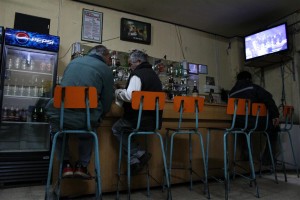
About two hours later I concluded that Chilenos are, essentially, completely mental. But in a nice way :o) They arrive, in their slightly too small costumes, from different directions at the specified address. And they must keep quiet outside and not be discovered. Because nobody expects the mariachi.
At the allotted moment they all pile into the house and the singing starts. The lady whose 50th birthday it was seemed bemused at first, but appeared to enjoy. Her husband, however, was a strong, surly type who looked like someone who made a living from ripping lorry tyres from their rims with his bare hands.
Still, he didn’t kill any of us so I gues it was OK for him.
And then it was off for a burger. I was granted my wish of a vegetarian sandwich, which turned out to be a chip sandwich with salad and avocado in it that tasted suspiciously meaty (cooked on the same griddle, no doubt)… but I had to chuckle at many of them ordering nothing more exciting than a cup of tea with their meal. Which was, of course, served in china, with a saucer. Don’t see that much in English burger bars at 2am in the morning…

It’s now Saturday here and I’ll admit to a slightly lazy day. I got up late, wandered around town, had yet another terrible breakfast (they’re better in Peru, I have to say) and generally felt slightly subdued. The day before had been quite happy, really, and now it was simply about going back to normal. I have no tasks left until Monday, and attempts to find options such as teaching people how to create websites have failed to elicit much interest.
So I’ll go through the small bag of items I took from my father’s place, take some notes, and generally meander today. Don’t expect an exciting post tomorrow! I also have to decide what to do next. I still have two weeks to use up, but no clear leads in other countries. I suspect once I’m finished here it might just be time for a bit of a holiday. I just need to decide – relaxed, or exploratory? Any thoughts?
Chris Coveney…the Introduction
I’ve started writing this post in Amsterdam airport…I’m on my way to Arica in Chile where I’ll be (hopefully) burying my father, Chris, who died on the 19th of July. I say hopefully not because this is something I’m looking forward to but because I face a number of legal and monetary issues with the hospital where he died.
So, the backstory….

My father was born in 1944 in Liverpool. He had a childhood disrupted by his father’s death while he and his mother were travelling to join him in post-war Frankfurt. At the age of 4 (I believe – this needs checking) it seems that this had a somewhat traumatic effect on his life. Whether it would have worked out any differently if his father hadn’t died so young is hard to know. It seems he never really bonded with his rather quiet and gentle stepfather, John.
John was one of those people that sadly get little praise in life…he didn’t have a rapier wit, good looks or intense charm. His predecessor, it seems, did. But he did do his best to provide a stable and comfortable environment for my father and grandmother (I later lived with them at different times of my life.)
Yet it seems that my father inherited his father’s flaws (a taste for women, good times and risk taking) without some key strengths (a disciplined and intellectually rigorous upgringing in particular) that would have helped my father excel. He was certainly charming, good looking and intelligent.
Family Life
My father, to the best of my knowledge, had three children… myself first, David, in 1969, Miguel two years later, to his first wife Ruth, and Maria in 1981 to his second wife Ann.
It’s fair to say that neither marriage went well. To paraphrase my mother:
He was a drinker with a vicious temper and a long arm. He couldn’t understand the word no.
There are other things I’ve learned recently which I won’t share…but the picture was of a man who couldn’t take his responsibilities seriously and, when confronted, would lash out at anyone around.
The Consequences
 I’m going to skip forward now to 1985… by this point my father had been divorced twice and no longer had custody of any of his children. He’d kept me close for years, but even I tired of his temper, his constantly failing relationships and the occassional humiliation of a beating. It’s a curious thing about being smacked around by your father…the physical pain is nothing. It’s the betrayal of trust that hurts and damages you. No parent should resort to violence when faced with the annoyances of raising a child. Nor, of course, should a child ever survey a trashed kitchen following violence between their parents. Ever. I could go into the reasons why violence breaks out in domestic settings, but that subject deserves better than I can give right here.
I’m going to skip forward now to 1985… by this point my father had been divorced twice and no longer had custody of any of his children. He’d kept me close for years, but even I tired of his temper, his constantly failing relationships and the occassional humiliation of a beating. It’s a curious thing about being smacked around by your father…the physical pain is nothing. It’s the betrayal of trust that hurts and damages you. No parent should resort to violence when faced with the annoyances of raising a child. Nor, of course, should a child ever survey a trashed kitchen following violence between their parents. Ever. I could go into the reasons why violence breaks out in domestic settings, but that subject deserves better than I can give right here.
Since 1971 my father had been working his summers as a tour guide in Oostende, Belgium. This suited him fine…a steady stream of giddy girls on holiday, few responsibilities, and plenty of nights out left him, it seems, relatively contented.
South America
By this point my father, always a keen lover of all things Spanish, had started to spend his winters in South America where he could travel around enjoying himself whilst maximising the money he earned in his Belgian summers.
This was actually a fairly calm period… I lived with my grandmother and rarely saw him. Generally I did enjoy his company, but there was always a nervousness over when he might kick off but, in general, he seemed to have mellowed.
Unfortunately, in 1987, everything changed again. I was living with my grandmother and had done reasonably well in my A levels. I’d gained a job at ICI on a trainee developer program. For me, at least the future looked good. However, like all good things in my life there always seemed to be trouble waiting for me.
Loss
Just a couple of weeks into my new job, my grandmother was diagnosed with lung cancer. Her decline hadn’t been pleasant to experience and before she was diagnosed she’d been struggling with shoulder pain that left her crying until the doctor could come and give her a shot of painkillers. Eventually it became too much for both of us. She was booked into hospital in a few weeks time… but that was too far away. I learned then a painful but valuable lesson.
The doctor could do nothing to have her admitted more quickly. I visited the hospital. No, they could do nothing either…it was a non urgent case of painful arthritis. Yet it was all too much to bear…I was in tears when a male nurse took me to one side and explained something…
They’re letting you look after her. She’s dependent on you. You want to know how to get her into hospital quickly? Refuse. Just tell the doctor you’ve had too much and you’re moving out.
Basically, I was going to have to play poker with my granny. But I went straight from the hospital to the doctor’s surgery and insisted I saw him. Three hours later, an ambulance arrived.
The next day they discovered the pain was caused by secondary metastasis (I think that’s the correct term, I’m writing this on a plane). She had advanced lung cancer that had spread through her body. She had less than a week left.
There was a dull, hollow ache inside me. I wasn’t close to my mother since I’d not lived with her for 14 years and besides, her and her new family had moved to Spain two years earlier – something that at the time had left me less than impressed.
I had my friends, Linda and Peter especially who were wonderfully understanding. And that weekend, my father’s summer job finished and he was able to arrive.
So he signed over everything. It was down to me to deal with the estate. There wasn’t much there, to be honest, and a lot of debt.
My father had his tickets for South America booked a long time earlier…in this time air travel was still relatively expensive and inflexible. I later learned that airlines usually aren’t so bad in cases of bereavement. I think he could have changed flights.
But he didn’t and just a few days later he was gone. Two days after that I buried my grandmother.
What’s crazy is that in all this I even managed to redecorate the lounge in time for the funeral, thanks to my friend Linda. It was important that in death everyone saw the best in my grandmother…
Losing Trust in Everyone
Soon after the vultures were circling…I couldn’t take over the mortgage or I’d have to pay off all debts, and I couldn’t get a new mortgage at such a young age and such little credit history…especially on a shared ownership house like this.
You see, what happens with a debt secured on property is that you hand over all rights to the lender. If you fail to keep up repayments the lender can take possession. The lender will then sell it. If a profit happens to be made then that’s great for the lender. They keep the money.
In fact, some even have a policy of quick repossessions during a buoyant market.
In retrospect I believe I was badly advised. But lacking support just trying to hold down a job and simply live right was enough to occupy me. When I was evicted from the house I lost my faith in society, my parents (sorry Mum…but you later won it back, so that’s ok, trust me) and everyone except my friends.
The council couldn’t help – I was told a single male would be at the bottom of the waiting list for social housing.
I didn’t want my fathers’s help and, by the dubious measure of taking out a loan to pay the deposit on a tiny studio flat, I had a place to live. While this was happening my father was made redundant from his summer job and announced he was going to stay in South America.
Having discovered financial wizardry I even managed to buy myself a niceish car I couldn’t afford on credit. Life had been hard, but now, I felt, it was improving.
Two months later I received a letter from my father asking for help – he said he’d been robbed of all his money and needed the money I owed him (I think he believed there was money in his mother’s estate) and could I send £1500 as soon as possible.
I had about £30 in the bank.
The next six months were hell as I sent over dribs and drabs in response to his increasingly strident letters, but I remember one triumphant moment. I’d been caught at work calling the Chilean embassy. I was in trouble until the reasons were explained to a senior manager. He put me in touch with the right people and before I knew it the Foreign Office offered a loan to help repatriate my father.
I’d done it. He was going to be ok. I’d sent as much as possible to him, borrowing money, trying to sell what I could legitimately sell… but it amounted to no more than around £600 over the months.
I went out and bought a £15 phone card to give the good news.
Son… I thought you had a good job? I need the money why don’t you have any?!
I told him it was no problem… I could get him home! I explained the loan.
What use is that? I’d be in the same situation, but in England…it’s much cheaper to live here
He was angry. And I remembered all those times he’d been angry before. The card ran out cutting him off mid-sentence. It was over. I was never going to speak to him again. I realised he hadn’t been asking me for help…he’d been asking me for money, that’s all.
Since then I stopped responding to his letters. I’d been struggling with the flat so I sold up and moved into a room. We lost contact.
Update 29-08-2010: I was reading through his letters yesterday and realised that I’d found the solution of a loan for repatriation earlier than I thought I had. I’d simply brought it up again during that last phone call and he essentially repeated what I’d said. I also think I’d continued to send him money for a while, but remained mute.
In 2001 I managed to find out that he’d renewed his passport in Quito in 1997, but that was all I had. In 2006 I was invited to a wedding in Lima, Peru, and took that as an opportunity to try and find him. I got close…searching the town of Arica in the far north of Chile. But if he saw the notices he didn’t respond. If he’d even searched Google he’d have found me for years and years. I even put a page up about him which was good enough for my estranged sister to find me with this year. In the end I reached the conclusion that he no longer wanted to find me.
And then the knock on the door in the early morning. I don’t know why the police do it that way. The officer was perfect…knew exactly how to break the news. Quickly, succintly, followed by the detail. He’d died on the 19th of July in a hospital in Arica, Chile.
I’m going to wrap this up now…it’s an awfully long piece to type entirely by phone and my fingers are aching. Hopefully I’ll be able to post it up on arrival to Lima. More soon… my plan is to document this trip, my feelings and my need to find reconciliation wherever possible. Sharing helps.
Differential Pricing with Airlines
The traveller on a budget faces the very real problem that airlines employ differential pricing depending on where you are. Here’s my example – the next post will explain whether I got the lower price or not!
The traveller on a budget faces the very real problem that airlines employ differential pricing depending on where you are.
Here’s the UK page for a one way flight, with the otherwise excellent LAN Airlines, from Lima to Tacna in Peru:

And now, the price if you go the Peruvian version of the site:

Same flight, same class, same airplane.
Now, I know your average Brit makes considerably more money than your average Peruvian, but here’s the thing – if a McDonalds in Lima had two price boards up and the European one had prices three times as high you can imagine how that would make the average customer feel. I have actually seen this, where an English menu and a Spanish menu had different prices (and why it’s worth learning the local lingo at least a bit) but over 3x is bonkers.
Now, let’s see if I can book through the Peruvian version of the site. If they block me I’ll just have to call a Peruvian travel agency. Simple!
It also makes me wonder – had I been flying Lima to Liverpool and back, rather than the other way around, how much less would KLM have been charging? It almost makes me think of Adobe.
Quick Follow Up:
If you click through, you get the following message on the Peruvian site:
![]() In other words, don’t even think about it! The price is available only to Peruvian residents. The cheapest price otherwise is a good $80 higher. Still a lot cheaper than the Brit price, however.
In other words, don’t even think about it! The price is available only to Peruvian residents. The cheapest price otherwise is a good $80 higher. Still a lot cheaper than the Brit price, however.
I suppose I could try another airline, but I once had a flight on a plane that was condemned soon after following safety ‘incidents’ when I flew on a Peruvian budget carrier, so I’m not wild about shopping around too much just yet.
Cuzco by Night
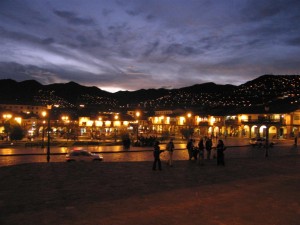
Cuzco is one of those places – full of foreigners who got there and thought “hey… let’s stop a while longer” and then don’t leave for years. It’s vibrant, beautiful, friendly and prosperous. See it while it’s still relatively unspoilt.
If you like this shot, you may wish to check out my photoblog, which I’m now going to make a more serious part of my website, albeit with its own style specific to displaying large images.
Santa Catalina Convent, Arequipa
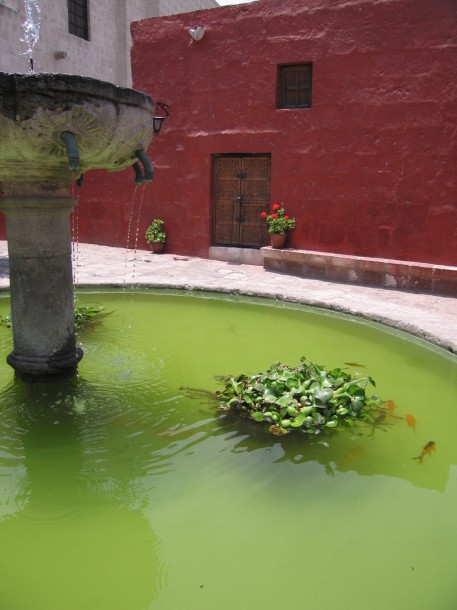
The water looks dirty, but isn’t. You can see the goldfish clearly enough after all.
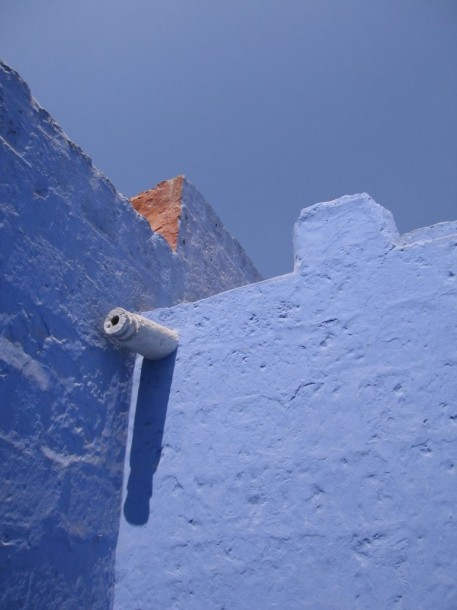
The Santa Catalina Convent in Arequipa is an astonishing city within a city. In spite of the noise and bustle of the city outside, it manages to maintain a quiet calm. The nuns who lived here (and a small number who still do) may have led an ascetic and simple life, but they also had a very beautiful place to live as well. Fantastic light, colours and views.
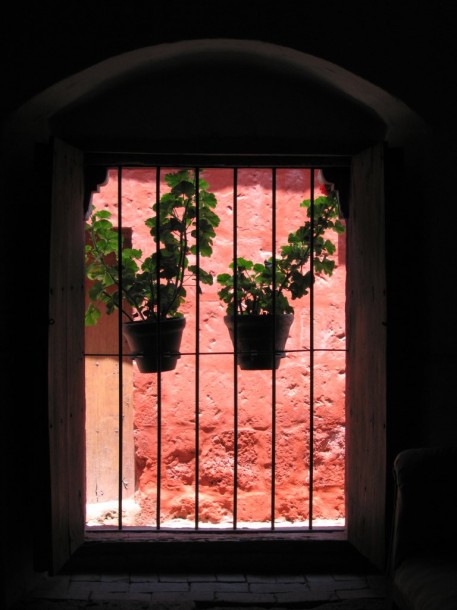
The colours here just knocked me out. They say that mid-day isn’t a good time to take photos, especially in the tropics, but you can’t really go wrong when the subject matter is so good.
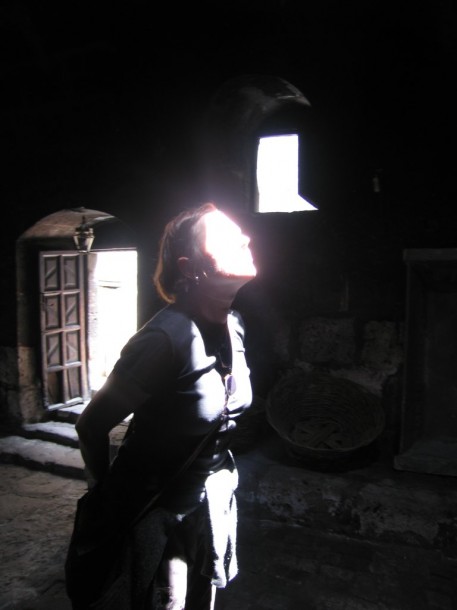
Being a b3tard…
I have a thing about the b3ta.com site. It keeps me tickled in those quiet moments. The fact they mentioned my botfly incident in their newsletter meant this site’s traffic and ranking improved a fair bit for a while, and occassionally I post answers to the question of the week spot. A couple have made it to the ‘best of’, which is nice.
And today I thought, let’s do an image for their ancient monument new uses image competition.

And below is a link to a desktop version of the image, if you want it.
And on the side of one hill, near the lines, is this little fella – image modded a bit to improve contrast. Sadly can’t easily see that he’s actually waving. Maybe he knew something about the lines?

Oh, and in case you’re not a combination Star Wars/travel/geography/conspiracy geek – here’s the explanation, though it’s less interesting than working out for yourself the reasons behind the picture:
1: It’s the Nazca lines – an amazing place in the Atacama desert, in southern Peru. You can get a nutter in a light plane to make daredevil passes at ridiculous turn rates over the lines in order to get you the best views. It costs just $50 a person.
2: It’s the Millenium Falcon – Hans Solo’s space ship in Star Wars.
3: A surprising number of people think that the lines were put there as landing strips for aliens – and they do indeed look like desert runways. More likely is that the local population were into water worship and the lines relate to where water comes from. They obviously also had a fair amount of time on their hands whilst being pretty good at planning and geometry. Some of the lines would be difficult to set out with modern equipment.
